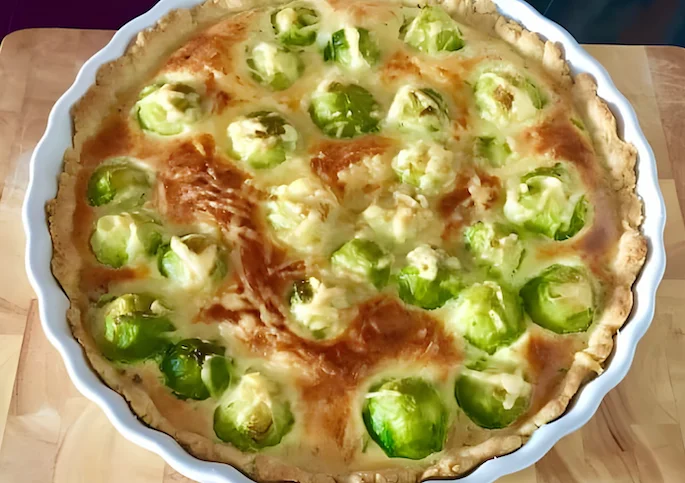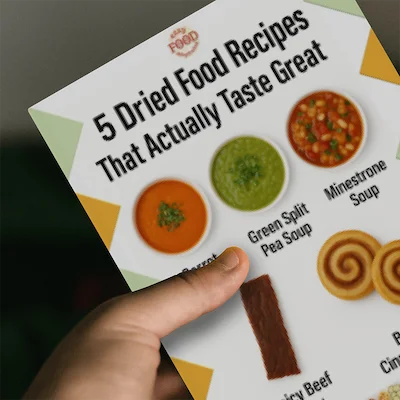What We Mean by “Dehydrate”
Here at Easy Food Dehydrating, “dehydrate” always means using an electric food dehydrator — the easy, reliable way to dry food at home.
- Home
- Dehydrating Vegetables: Step-by-Step Guides by Type
- Brussels Sprouts: How to Dehydrate & Enjoy Them Year-Round
Brussels Sprouts: How to Dehydrate
These Mini Veggies to Perfection

Brussels sprouts aren’t just holiday side dishes — when dehydrated, these mini cabbages transform into nutrient-packed pantry staples. Drying them locks in flavor, cuts waste, and makes them easy to use in soups, casseroles, or even crunchy snacks.
✅ Quick Answer: Can you dehydrate Brussels sprouts?
Yes — halve or quarter Brussels sprouts, place them on dehydrator trays, and dry at 125–135°F for 6–8 hours until crisp. Store in airtight containers for up to 12 months, and rehydrate later for soups, casseroles, or side dishes.
If you’ve never tried dehydrating Brussels sprouts before, this simple guide shows you exactly how to prep, dry, and store them so you can enjoy sprouts year-round.
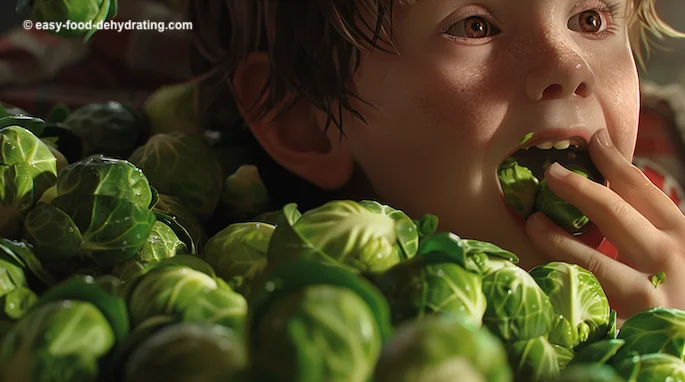
I know most of us enjoy these earthy sprouts at Thanksgiving or Christmas, but they are nutritious veggies you should enjoy any time of the year.
Brussels Sprouts Nutrition: Why These Mini Cabbages Pack a Punch
Don't underestimate these tiny powerhouses.
VITAMINS: C, K, A, and B6, along with Folate.
MINERALS: Manganese, Potassium, Iron, Magnesium, and Phosphorus.
100 grams of sprouts provide just 45 calories. They have 3.38 g of protein, 3.80 g of dietary fiber (10% of RDA), and zero cholesterol.
Brussels sprouts are excellent sources of Vitamin C; 100 g sprouts provide about 85 mg or 142% of the RDA.
When steamed, they have a cholesterol-lowering benefit, according to The George Mateljan Foundation. The foundation says, "You'll want to include Brussels sprouts as one of the cruciferous vegetables you eat regularly if you want to receive the fantastic health benefits provided by the cruciferous vegetable family."
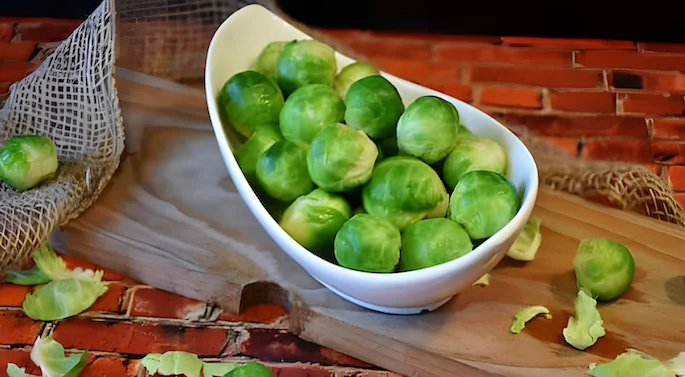
Quick Prep Tips to Get Your Sprouts Ready for Dehydrating
Rinse the sprouts first. If you need to peel the outer layers of the sprouts, just cut off a bit of the hard-stem base to make peeling off the outer leaves a little easier.
This gives you a nice flat bottom so you can safely cut the Brussels sprouts in half, then follow the dehydrating instructions below.
Step-by-Step Guide: How to Dehydrate Brussels Sprouts Perfectly
- Remove the small outer leaves and
rinse if necessary under cold water. Slice them in half.
- Arrange on your food dehydrator trays.
- Turn on your food dehydrator and set the temperature between 125°F and 135°F (or per your food dehydrator's instructions).
💡 Tip: Outside the U.S.? Most dehydrating temps here are listed in Fahrenheit - use our quick converter to see the Celsius equivalent for your machine.
How Long Do Brussels Sprouts Take to Dehydrate?
- Fully dehydrated sprouts will be wrinkly and crispy when fully dried.
- Drying time: between 6-8 hours.
- Please remember to rotate your dehydrator trays, for even drying.
If you choose to cut your sprouts into quarters, that will speed up the drying time too.
Best Ways to Use Rehydrated Brussels Sprouts
After rehydrating the sprouts, consider baking them like this super cheesy quiche from a site called 12 Tomatoes!
Here's the Brussels Sprouts & Gruyere Quiche recipe link.
After rehydrating the sprouts, consider baking them like this super cheesy quiche from a site called 12 Tomatoes!
Pan-Fried Brussels Sprouts: Easy Flavor Boosts
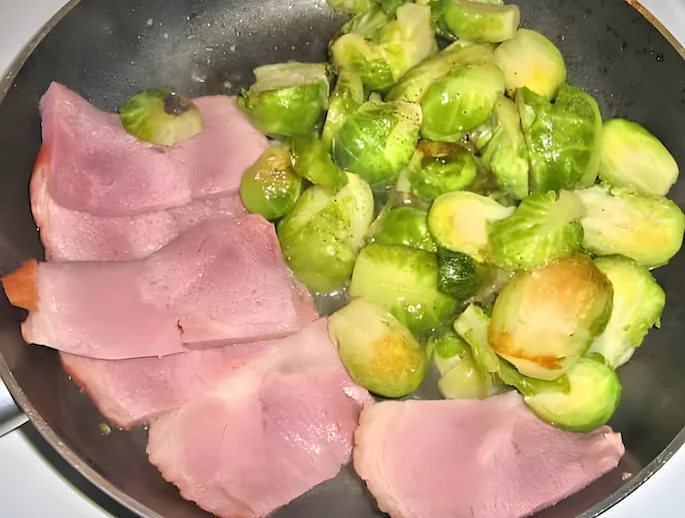
I know many folk turn their noses up at Brussels sprouts—yes, I know they are quite a pungent, bitter vegetable, but you can make them taste a little sweeter by frying 'em up in a pan with slices of sweet country ham.
I can only imagine how good the sprouts are with the sweetness of the ham!
I have one of Gordon Ramsay's excellent cookbooks. I was learning how to cook a turkey properly one Christmas. He had a brilliant suggestion: sauté sliced Brussels sprouts in a pan along with diced bacon. Now you're speaking my language. Bacon. Bacon. Bacon!
Cooking Brussels Sprouts Beyond Dehydrating: Boil, Roast, or Bacon-Wrap
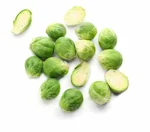 Camtasia - Registered User
Camtasia - Registered UserCooking Brussels sprouts is easy. Simply wash them and remove any damaged leaves. Cut the sprouts in half and cook them in boiling water for 3-5 minutes.
You can also roast Brussels sprouts in the oven. Simply toss them with olive oil and seasonings, and roast at 400°F for 20-30 minutes.
To me, they can be very strong tasting. To combat that a tad, add crumbled-up bacon to them after cooking and slicing (as mentioned in earlier).
Another way to eat yer sprouts is to wrap them in bacon a la Gordon Ramsay (mentioned earlier). Get a bacon rasher (a slice) and cut it down the middle then wrap it around the sprout and tuck in the end to keep the bacon in place. Bake as above.
What’s a Rasher? And Why Bacon + Sprouts Just Work
If you're wondering (like I was) where the word "rasher" came from, I called on ClaudeAI to help me out. He said it derives from the Old French word "rasche" meaning "portion."
Claude added - and I really like
this: A rasher is hastily cooked
meat or burned meat - often cooked quickly in a pan over high heat. OK - like when we do something "rash" - in haste - it's
usually done on the spur of the moment, i.e. "rashly" and often with regret!
I know I've eaten lots of bacon "rashers," Ha!
Why Are They Called Brussels Sprouts? (Fun Food History)
As you may have guessed, Brussels Sprouts are named after the city of Brussels in Belgium. They were first cultivated there in the 13th century.
As a kid, I used to call them Brussel Sprouts without the last "s" in Brussels. It seems I never put "two and two together" back then - that they were sprouts from Brussels!
Why Do Brussels Sprouts Taste Bitter (and How to Fix It)
Brussels sprouts have a strong, cabbage-like taste because they are in the same plant family as cabbage. They also contain a compound called glucosinolate, which gives them their characteristic flavor.
So there you have it. Get busy dehydrating these tasty treats today and enjoy them year-round. They're not just for Christmas or Thanksgiving anymore!
Brussels sprouts aren’t just for the holidays anymore — once dehydrated, they’re ready to join your pantry lineup for everyday meals. Try them in soups, pan-fried dishes, or rehydrated in a quiche or casserole.
And don’t forget to grab your free 5 Dried Food Recipes PDF (below) for even more ideas that prove dehydrated veggies can taste amazing!
Got a Question About Brussels Sprouts? We’ve Got Answers!
Can you dehydrate Brussels sprouts whole?
Can you dehydrate Brussels sprouts whole?
Yes, but halving or quartering works best. Whole sprouts take longer and may dry unevenly, while sliced sprouts dehydrate faster and store more consistently.
Do Brussels sprouts need blanching before dehydrating?
Do Brussels sprouts need blanching before dehydrating?
Blanching is optional but recommended. A quick 3–4 minute blanch helps preserve color, reduces bitterness, and speeds up drying time.
How do you store dehydrated Brussels sprouts?
How do you store dehydrated Brussels sprouts?
Store in airtight glass Mason jars or vacuum-sealer bags, kept in a cool, dark place. Properly dehydrated and stored sprouts can last up to 12 months.
What do dehydrated Brussels sprouts taste like?
What do dehydrated Brussels sprouts taste like?
They taste earthy and slightly sweet, with a more concentrated cabbage-like flavor. Once rehydrated or pan-fried, they mellow out and pair beautifully with bacon, ham, or balsamic vinegar.
Can dehydrated Brussels sprouts be eaten as snacks?
Can dehydrated Brussels sprouts be eaten as snacks?
Yes! If dried until extra crisp, they make a crunchy, low-calorie snack. Try seasoning them lightly before dehydrating for extra flavor.
Dehydrated Brussels sprouts aren’t just for the holidays — they’re a year-round way to add flavor and nutrition to everyday meals. Whether you toss them into a hearty soup, bake them into a cheesy quiche, or enjoy them pan-fried with bacon, they’ll surprise you.
And for even more inspiration, don’t forget to grab your free 5 Dried Food Recipes You'll Actually Love PDF (below). From split pea soup to banana cinnamon rolls, you’ll find easy, delicious ways to enjoy dehydrated food.
Get 5 Dried Food Recipes You'll Actually Love
Here's where you can get your copy of our all new
5 Dried Food Recipes (That Actually Taste Great)
They're my all-time favorite easy dried food meals!
Get it here right now.
For Free!
Before You Go...
If you enjoyed this page, tap the ❤️ in the lower right-hand corner.
It saves this page to your Grow bookmarks so you can find it again later.
You’ll also see quick share buttons to copy the link, post to Facebook,
or save it straight to Pinterest.
